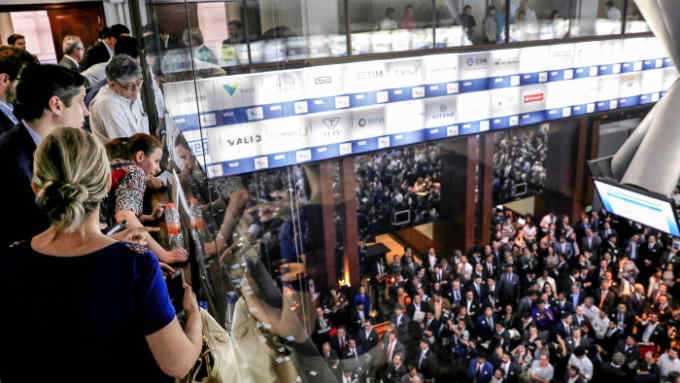Brics, Venezuela and fight against crime fill Brazil presidential in-tray

Roula Khalaf, Editor of the FT, selects her favourite stories in this weekly newsletter.
After 16 years of unprecedented foreign policy activism under Presidents Fernando Cardoso and Luiz Inácio Lula da Silva, Brazil’s visibility on the international stage declined markedly under Dilma Rousseff (2011-2016) and Michel Temer, her successor. To some extent, the swings might be explained by a leader’s personal preferences. Mr Cardoso and Lula enjoyed presidential diplomacy and travelled frequently. Ms Rousseff disliked air travel and had little patience for diplomatic intricacies.
Yet a closer look reveals that the factor that shapes Brazil’s foreign policy is more one of global dynamics that the president cannot control. Lula, in particular, enjoyed favourable macroeconomic conditions: low global interest rates and high commodity prices boosted growth and led to high approval ratings at home, allowing him to pursue an activist foreign policy.
Remarkably, Brazil was the world’s second biggest contributor to global growth in the first decade of the 21st century. When the global financial crisis of 2008 began and a global leadership vacuum emerged, Lula and his ambitious foreign minister Celso Amorim saw an opportunity to consolidate Brazil’s more prominent role — such as by co-founding the Brics grouping and taking the lead in several hotspots around the world, be it the UN peacekeeping mission in Haiti or negotiating a nuclear deal with Iran.
Lula’s successor, Ms Rousseff, faced less benign global circumstances, mostly because of lower commodity prices, made worse by disastrous interventionist policies at home, that led to economic collapse, public discontent and political instability after 2013. With approval ratings in the single digits and a lagging economic recovery, Michel Temer’s scandal-ridden presidency, mostly focused on day-to-day survival, has provided little space for an assertive foreign policy.
For the next government, the global outlook is far from ideal. The spectre of rising US interest rates limits Brazil’s growth prospects and commodity prices are unlikely to return to their 2011 peak soon. What seems like the return of great power politics poses a severe threat. Lacking hard power, Brazil is highly dependent on functioning and predictable global rules and norms. A China and US trade war may offer a few sector-specific opportunities but they will not offset the systemic cost generated by higher uncertainty.
And yet, provided that a moderate candidate moves into Planalto Palace on January 1 2019, chances exist for a more innovative foreign policy. Equipped with greater legitimacy, a full four-year mandate and higher approval ratings than the Temer government, its successor has a chance to use foreign affairs to help Brazil face its most urgent domestic problems.
First, a wave of new governments in the region will provide Brazil’s new president with an opportunity to lead — together with Argentina, Colombia and Chile — an urgent debate about the future of South America. The region’s failure to articulate a clear vision and to co-operate more effectively on a host of issues — ranging from the fight against corruption, organised crime, anti-drug policies, the environment and how to respond to the rise of China in the region — leaves national governments unable to tackle the majority of domestic problems. Organised crime thinks and acts globally and is generally able to outfox Latin American governments that often remain remarkably disconnected from each other. Since Brazil represents half of South America’s territory, population and economy, without a more open-minded and assertive government no real progress is likely towards deeper continental integration.
Secondly, the country should seek to reclaim the leading role in the international community’s response to the humanitarian catastrophe in Venezuela. Its collapse was partly made possible by Brazil’s unwillingness to take a more critical stance early on, mainly because it did not want to endanger the profits of its companies operating there. Brazil’s next president should lead a global effort to force the government in Caracas to accept large-scale humanitarian aid and create a regional fund to help Venezuelan migrants integrate and prosper in their host societies.
Finally, Mr Temer’s successor should emphasise Brazil’s OECD accession process, while also deepening its engagement in the Brics grouping [with Russia, India, China and South Africa], making it the only country to be part of both OECD and the Brics — a powerful symbol of the country’s role in the emerging multipolar order.
Given its growing dependence on Asia, the Brics status has never been more valuable to Brazil. The next president will assume the pro tempore presidency of the grouping — which involves organising the 11th Brics Summit in 2019 — and play host to the heads of government of the other Brics nations as well as a number of presidents from the region.
It will be a unique chance for Brazil to present to the international community a new narrative and lay out a clear plan of how to recover from one of the worst economic crises of the country’s history.
The writer is an associate professor in the school of international relations at the Fundação Getulio Vargas in São Paulo

Comments